Archive for March, 2010

Author makes case against race to local audience
 (CNS): Local author Guy P. Harrison recently presented an enthusiastic and enlightening lecture about his latest book, “Race and Reality,” at Books and Books, Camana Bay. Harrison presented the case that races are inconsistent and illogical cultural creations rather than the natural biological categories that most people around the world still believe them to be. He described his book as a sweeping survey of the scientific arguments against common race belief. Harrison’s lecture was followed by a lively question and answer session. After that he signed copies of his book.
(CNS): Local author Guy P. Harrison recently presented an enthusiastic and enlightening lecture about his latest book, “Race and Reality,” at Books and Books, Camana Bay. Harrison presented the case that races are inconsistent and illogical cultural creations rather than the natural biological categories that most people around the world still believe them to be. He described his book as a sweeping survey of the scientific arguments against common race belief. Harrison’s lecture was followed by a lively question and answer session. After that he signed copies of his book.
“Anthropologists have been saying for decades now that races are not real and that it makes no sense to tie things such as intelligence and behavior to skin color or hair type,” Harrison told the large turnout at the Grand Cayman bookstore. “We are a very young species and too closely related to justify racial categories. There are no boundaries between us other than the ones we imagined and created. The science is clear about this. Biological races are not real.”
He said, “I’m very grateful to Books and Books for inviting me to do this. It was very well organized and I had fun. I was happy to see so many people showup. Holly Smith and Bianca Freeland did an excellent job putting the event together.”
“Race and Reality” has already earned high praise from the academic community. “For decades scientists have amassed evidence demonstrating that the human species has no races,” says Jefferson M. Fish, Professor Emeritus of Psychology, St. John’s University. “Harrison’s book makes this knowledge accessible, and knocks the props out from under scientific arguments that have been used to justify racism.”
“Guy Harrison’s well-written and passionate plea for eliminating the idea and ideology of race should be widely read,” adds Audrey Smedley, Virginia Commonwealth University Professor Emerita of Anthropology and African-American Studies. “He has shown that the idea of race not only is contradicted by science but is a social anachronism that should not be tolerated by society in the 21st century.”
“Race and Reality: What Everyone Should Know about Our Biological Diversity” is Guy’s second book. His first book, “50 Reasons People Give for Believing in a God,” was an Amazon bestseller in its category in the US, UK, France, Germany, Canada, and Japan. In the United States, it even surpassed Richard Dawkins’ international bestseller “The God Delusion” for a time.

Perceptions of fear
Where I can agree with all or most of the comments about who and what is responsible for the current serious crime in Cayman, I would like to point out some very obvious facts to address some posters who appear to be living on a different planet.
The four contributing factors of crime in Cayman now are: 1) Perception of risk, 2) Confidence in the police, 3) Fear of crime, and 4) Criminal victimization.
Perception of risk from crime influences the confidencein the police because the perception of the disorder and crime on the island directly influences and effects the island’s population’s perception. Logically, citizens’ dissatisfaction with the police’s performance or lack of confidence in the police is derived from a high anxiety about being victimized in their own community. The interaction between the perception of risk and confidence in the police could provide an understanding of the threat posed to persons in the community.
The fear of crime is a major indicator to measure people’s perception of being victimized. The fear of crime can be measured with two basic questions: How safe do you feel being out alone in your neighbourhood at night? Are there “no go” areas in the immediate vicinity of your neighbourhood?
These two questions are very good indicators of the perceived threat or risk of victimization on you as an individual, based on your interaction with the environment that you live in. Each person may evaluate the risk differently and such a perceived risk may not parallel the actual level of risk in a situation. In contrast, fear of crime is an emotional response to the perceived risk of threat in one’s environment. The judgement of risk involves a cognitive process. The judgement of risk from criminal victimization may be influenced by the prevalence of disorder in an individual’s immediate environment.
The perceptions of personal risk of victimization and perceptions of neighbourhood risk of victimization are linked, due to the present rate of criminal activity in the community. If people perceive their community to be a high threat area they are more likely to perceive themselves to be at high risk. This in turn implies that confidence in the police may play a role in such risk perception.
People or communities who believe that the police perform well at their task or duties are likely to evaluate the risk of victimization as less than those who do not have that confidence in the police. Often those individuals who criticize the police are the people who live in high crime areas and experience, first hand, the insufficient activity by the police.
Confidence in the police is affected by three distinctive factors that contribute to the public’s confidence: Fear of crime, risk of victimization; and safety of your neighbourhood.
That confidence in the local police was predicted by perceptions of crime in the area and perceptions of the criminal’s lawlessness in the community. The perceived safety of a neighbourhood is also found to be significantly correlated with confidence in our police service.
Undoubtedly our law enforcement agencies have to heavily depend upon the cooperation of the local citizen to perform their duties efficiently and effectively, and our confidence in our police is crucial to ask or acquire citizen’s assistance cooperation and participation in a variety of the local community related police assignments or duties. In assessing local citizens’ confidence in the police has special relevance to attempts to implement community policing.
Confidence in the police also has a significant impact on perceived risk of threats relative to satisfaction with police contacts as being a victim or a witness of a crime.
In Cayman financial status/income, experience with crime as a victim or a witness, and confidence in the local police, were primary factors of risk perceptions. Income, in particular, may function as an indicator of the objective level of risk of criminal victimization and concern about safety of the community as well.
In Cayman one can reasonably conclude that lower income residents are more likely to live in high crime areas and are at greater risk of criminal victimization.
In fact, people in Cayman who have actually experienced contact with the police as a victim or a witness tend to expect that the RCIPS can aggressively resolve crime problems in this community, which may, directly or indirectly, alleviate the perceived threat of violence.
A simple act to make people feel safe is if the RCIPS patrolled the neighbourhoods frequently, regardless of their socio-economic status. Another area that will improve the confidence in the RCIPS would be if the RCIPS managed the police-citizens contacts in a satisfactory manner.
The reciprocal relationship suggests that strategies, such as community-based policing, are designed to address the perceived risk of criminal victimization and may also enhance confidence in the RCIPS and finally, added to this dire situation, is the suspicion of corruption which on its own undermines political social and economic stability, threatens security and damages public confidence and trust in the government, which in turn effects people’s daily lives and its consequences and cost are immense.
The Cayman public knows and understands that this is not rocket science. Why can’t the government?
I cannot count how many times we warned senior government as well political officials in both parties about the coming crime and corruption situation. These were reinforced with numerous socio-economic and criminal intelligence reports that they wilfully chose to ignore by listening to their own economic and political interest.
The wilful neglect of such reports (which, by the way, no longer exist — destroyed by Hurricane Ivan, I guess?) along with the dismantling and destruction of certain working units within the RCIPS by "forcing out" of some very capable officers is nothing short of criminal, to be replaced by promoting ‘old boy network’ cronies and foreign nationals with their own political agendas, has also contributed to this dire crime situation and has cost Cayman millions of dollars.
Cayman, the significant challenges we face cannot be resolved at the same level of thinking we were at when we created them.
‘Tempura’s Ghost’ is a former member of the RCIPS.

UK minister ties knot with gay partner
 (CNS): The minister with responsibility for overseas territories, Chris Bryant, made history this weekend when he became the first homosexual MP to enter into a civil partnership in the Houses of Parliament. The UK minster and Labour MP for Rhondda, who is also a former Church of England clergyman, tied the knot with his partner, Jared Cranney, a company secretary, on Saturday. The couple’s ceremony took place in the Members’ Dining Room, overlooking the Thames after the Speaker John Bercow gave his permission for it to go ahead. In a statement released afterwards, the couple said they were "enormously grateful" to Mr Bercow and Leader of the Commons Harriet Harman for making the "really special day" possible.
(CNS): The minister with responsibility for overseas territories, Chris Bryant, made history this weekend when he became the first homosexual MP to enter into a civil partnership in the Houses of Parliament. The UK minster and Labour MP for Rhondda, who is also a former Church of England clergyman, tied the knot with his partner, Jared Cranney, a company secretary, on Saturday. The couple’s ceremony took place in the Members’ Dining Room, overlooking the Thames after the Speaker John Bercow gave his permission for it to go ahead. In a statement released afterwards, the couple said they were "enormously grateful" to Mr Bercow and Leader of the Commons Harriet Harman for making the "really special day" possible.
“We never thought this day would come – and never thought we’d have to worry about cakes and flowers and rings," they said. “It’s amazing howmuch things have changed in such a short time.”
The Civil Partnership Act 2004 gave gay couples the right to obtain the same inheritance and legal rights as married couples.
Bryant was also the minister ultimately responsible for supervising the establishment of the Cayman Islands Constitution 2009 and its bill of rights, which has been drafted in such a way as to prevent any similar rights being afforded to gay couples in Cayman.
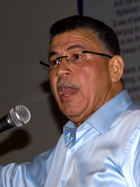
Mac calls for regional prison
 (CNS): The premier is going to suggest that all the overseas territories pool their resources to build a regional prison for serious offenders in a non-OT jurisdiction. McKeeva Bush said that as the criminals didn’t seem to mind going to Northward he would approach his colleagues in the territories about buying, renting or building a facility that all the territories could use to send their most serious offenders that would be in a completely different country. Speaking at a public meeting in West Bay, Bush was also clearly frustrated by the lack of control elected officials have of the police and the rejection of his ideas by the commissioner to bring in an outside task force to address the escalating violence in the community. (Photo Dennie Warren Jr)
(CNS): The premier is going to suggest that all the overseas territories pool their resources to build a regional prison for serious offenders in a non-OT jurisdiction. McKeeva Bush said that as the criminals didn’t seem to mind going to Northward he would approach his colleagues in the territories about buying, renting or building a facility that all the territories could use to send their most serious offenders that would be in a completely different country. Speaking at a public meeting in West Bay, Bush was also clearly frustrated by the lack of control elected officials have of the police and the rejection of his ideas by the commissioner to bring in an outside task force to address the escalating violence in the community. (Photo Dennie Warren Jr)
The country’s political leader said that although he had asked the police commissioner to bring in a task force to give the criminals a “kick where it hurts”, the commissioner had not agreed but had said he was taking an aggressive approach and would be rounding up the criminals by use of existing legislation.
“I have talked about a task force and I think we need that but the commissioner does not see it that way … he does not think a swot team will work but that greater government, community and police cooperation is the answer,” Bush explained, emphasising that elected officials had no power over the police, and when he had tried to change the way things were in 2003 people had marched against him and accused him of seeking independence.
Speaking about Northward prison and in particular the security problems and the conditions, Bush said he didn’t think the people were afraid to go there and that Cayman needed somewhere else to send its serious criminals. “I am going to propose to my colleagues that we develop … a regional prison for serious crime that will be in a country outside of the territories,” he said. “All of us would put our funds in to get an outside prison … a place where human rights don’t bother them so much.”
He blamed the introduction of human rights for the problems the country faced, as he said it was making it difficult to address the crime problems. “We have this thing here called human rights now … it is a hindrance to the hard way of dealing with the bold face criminality that is hitting us today,” the premier added, suggesting everyone who voted for the Constitution who thought it was going to be a great saviour to humans were now seeing that it was making things more difficult.
The premier pleaded with people in the community to help the police and said they needed the evidence to convict the criminals. He said mothers and girlfriends could save a life by telling the police where guns were hidden or if they thought a crime might take place. The community had turned a blind eye for far too long claiming “not my child”, but Bush said it was somebody’s child that was killing someone else’s child. He also offered his support to Police Commissioner David Baines, who has threatened to prosecute hostile witnesses.
He announced that he was requesting the deputy governor suspend parole, as he suspected the crimes were being committed by repeat offenders, who were being let out on license to come and commit the same crimes.
Both his West Bay legislative colleagues who were present at the meeting echoed the sentiments. Captain Eugene Ebanks said he knew some people didn’t trust the police as they had been known to leak information, but he said he thought they were past that now and people had to start to trust them.
The Minister for Education and West Bay’s second elected MLA Rolston Anglin emphasised that without forensic evidence the police relied on the community. He asked people not to be fooled by TV cop shows, as it was often the case that the criminals left no forensic evidence at a scene. “If you don’t have hard evidence from the scene and you don’t have evidence from witnesses you cannot prosecute,” he said, adding that it was easy to blame the authorities or the politicians but pointed out that he had not witnessed the crimes but someone out there who was remaining silent had.
He also announced that the government was asking for a telecommunication block at the prison and stop direct contact with visitors for serious offenders. He said that the prison would be introducing glass panels which would physically separate the prisoners from visitors.
Following the presentations by the MLAs, the community raised their concerns in the question and suggestion session that followed. People reiterated the long held belief that the police could not be trusted as they were leaking information, and one suggested “giving the drug to the young people” in the community. The popular sentiment was for harder and more punishments and some warned of vigilante justice.
A survey was also circulated asking what people wanted to see implement to fightcrime, such as the finger printing and DNA sampling of work permit holders, a national ID card, the publication of photographs of those people accused of crime as well as those charged, the wider introduction of CCTV and other issues relating to the limitation of civil liberties or crime fighting tools.
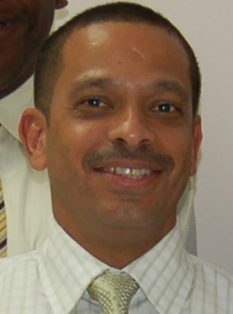
Health insurers face reform
 (CNS): Cayman’s health insurers will soon be required to offer their customers more comprehensive coverage and they will not be able to pick and choose who they insure and who they drop. The Minister of Health has said that the government is currently reviewing the health insurance law and in particular the level and quality of coverage offered under the basic plans through employer’s health insurances schemes. Mark Scotland told the Legislative Assembly that the health care providers need to offer more transparent, fairer, coverage and that government was no longer going to pickup the slack for every insurer who refused to cover clients or to pay claims.
(CNS): Cayman’s health insurers will soon be required to offer their customers more comprehensive coverage and they will not be able to pick and choose who they insure and who they drop. The Minister of Health has said that the government is currently reviewing the health insurance law and in particular the level and quality of coverage offered under the basic plans through employer’s health insurances schemes. Mark Scotland told the Legislative Assembly that the health care providers need to offer more transparent, fairer, coverage and that government was no longer going to pickup the slack for every insurer who refused to cover clients or to pay claims.
The minister was speaking during a private members motion debate when the MLA for North Side, Ezzard Miller requested a review of the law as he said he had received significant representation from his constituents with numerous complaints about health insures. He said people complained that they refusing to pay up, offered severely limited cover, dropped people when they moved from employer to employer o n the basis of pre existing conditions, as well as the inadequate coverage being given for what was still a significant premium even with basic coverage. Miller explained that because some insurance firms are not paying the doctors or the hospitals, the health care providers were now making patients pay before they would treat them, forcing them to make claims after the event.
“The health insurance industry is not providing the healthcare providers with guaranteedand prompt payments for services rendered to their clients leading to the unfortunate situation where persons who have already paid high premiums for health insurance coverage are forced to pay the healthcare provider ‘up front’ and attempt to reclaim the expense from their providers,” Miller stated in the House as he called on the minster to establish a select committee to review the legislation.
In his response the minister revealed that the review of the law was already well underway. Scotland explained that government had come up with a proposed new basic package which significantly increased coverage on everything from routine doctor’s visits to hospital stay costs as well as dental and maternity cover and was now in the process of negotiating a set premium with the insurance companies. He said the aim was to have a flat premium rate for the basic health package for everyone which would be the same no matter which company an employer would choose to use as cover.
Scotland said the goal was to provide accessible, transparent health care policies for everyone in the Cayman Islands and to reduce the numbers which the private sector was dumping on government through their refusal to cover the people they defined as higher risk.
“Government is currently playing a huge role in filling the gap of those who are under or uninsured,” he said, adding that the system was not working. He said the new legislation would not allow health insurers to drop people based on existing conditions or pick and chose who they insure when taking on employer’ coverage.
He also said that the health insurance commission would be given the power to prevent a health insurer’s license from being renewed if they were dropping clients or excluding high risk individuals, not paying health care providers are attempting to offer in adequate cover.
Scotland said the government wanted to get more people properly covered at an affordable transparent rate and to reduce the growing number of people the health companies wouldn’t cover forcing CINICO to take all the risks or the government to pay the hospital.
The ministry, Scotland said, was working on ensuring that all of the problems with the current system were addressed and as a result discussions were ongoing with all of the stakeholders including those buying the policies, the healthcare providers and the insurance companies and he hoped to have a bill to amend the existing law before the Legislative Assembly in June or July.
Closing his debate Miller warned the minister that trying to enlist the support and co-operation of the health insurers would be difficult and told him not to allow the health companies to negotiate the minimum premiums for the basic health plans or CHIC 1 but to enlist the services of independent actuaries and have them calculate what premiums needed to be paid to provide the new improved schedule of cover.
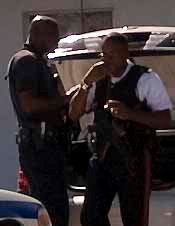
Cops round up shooters
 (CNS): In the wake of a yet another frightening escalation of violent crime in West Bay this week, the police said they have now arrested three men in connection with the murders of Alrick Peddie and Damion Ming. Following what an RCIPS spokesperson said was an “intensive police operation” in the West Bay area this afternoon, Friday 26 March, the men have been arrested on suspicion of murder. Officers from the RCIPS conducted a number of armed raids and rounded up the suspects in the West Bay area in which several houses were raided and searched. (Photo by Dennie Warren Jr)
(CNS): In the wake of a yet another frightening escalation of violent crime in West Bay this week, the police said they have now arrested three men in connection with the murders of Alrick Peddie and Damion Ming. Following what an RCIPS spokesperson said was an “intensive police operation” in the West Bay area this afternoon, Friday 26 March, the men have been arrested on suspicion of murder. Officers from the RCIPS conducted a number of armed raids and rounded up the suspects in the West Bay area in which several houses were raided and searched. (Photo by Dennie Warren Jr)
Police arrested a 17-year-old man and a 35-year-old man in relation to the death of Alrick Peddie, who was shot and killed in West Bay on Wednesday, 24 March, on Willie Farrington Drive, and they also arrested a 29-year-old man in relation to the death of Damion Ming, who was gunned down in the Birch Tree Hill Lane area of West Bay last night, Thursday 25 March.
During a police press conference on Wednesday afternoon Police Commissioner David Baines appealed to the community once again to assist the police and revealed a new confidential help line. He said this is being manned by hand-picked officers that the community can have the utmost confidence in. He vowed that the line (949-7777) was completely secure.
During the conference Baines made it clear that the police were well aware of the key players involved inthis escalating tit-for-tat gang violence but without evidence it was proving difficult to bring charges against what he called mindless thugs. He said the shootings were nothing more than gangs picking one from each rival group in revenge for the previous killings, causing the dangerous escalation in violence. He explained that the rivalry was between gangs with changing affiliations, but at present the disputes existed between two different West Bay gangs, as well as ones in George Town.
“We know who is responsible,” Baines said, but he explained the difficulty was securing evidence. He said his officers were on top of the gang members day and night when they were not in custody and they would continue to do this, but the community had to help. “The most direct way for us to bring charges is through eyewitness testimony,” Baines added.
The senior cop said the RCIPS would be utilising the gang legislation which has been on the statute books for some five years, but has so far never been used to bring in suspects until sufficient evidence could be found to bring charges against the triggermen for murder and attempted murder.
He said the RCIPS would also be prosecuting the victims and witnesses involved in the tit-for-tat violence who gave false statements or obstructed the police in their investigations. Above all he called on the mothers, girlfriends and family members of the gang members to reveal where the guns were, who was doing the shooting and who was planning another killing.
“These crimes do not happen in a vacuum; people know about these incidents,” he pleaded, asking them to come forward and stop the cycle of violence.
Police enquiries into both murders are actively ongoing and anyone who has any information is asked to contact West Bay police station on 949-3999, or this new RCIPS confidential tip line 949-7777.
Police say they have also charged three other men with attempted murder in connection with a recent shooting in George Town. See Police hunt 3rd GT gunman.
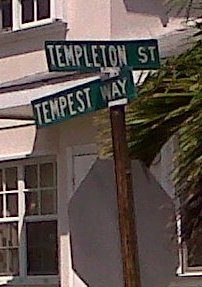
Police hunt 3rd GT gunman
 (CNS): Police said this evening that they have now brought attempted murder charges against three men in connection with a shooting in George Town earlier this month. Two of the men charged are currently in police custody while one remains at large and has been charged in abstentia. Police say they are currently hunting for 25-year-old Mark Anthony Seymour, a resident of George Town, while 27-year-old Luis Robert Verona from West Bay and Sven Brett Connor (29) from Newlands have been detained and are due to appear in court next week.
(CNS): Police said this evening that they have now brought attempted murder charges against three men in connection with a shooting in George Town earlier this month. Two of the men charged are currently in police custody while one remains at large and has been charged in abstentia. Police say they are currently hunting for 25-year-old Mark Anthony Seymour, a resident of George Town, while 27-year-old Luis Robert Verona from West Bay and Sven Brett Connor (29) from Newlands have been detained and are due to appear in court next week.
All three men have been charged with attempted murder following an incident in the Templeton Avenue area of George Town. At around 2.00 am on Friday 5 March it is alleged that shots were fired at, and into, a house in the Windsor Park area.
Anyone with any information about crime being committed on the Cayman Islands should contact their local police office or call the new RCIPS confidential tip line 949-7777.

Victim was 12 hours from jail
 (CNS): In a twist of fate the 29-year-old male victim shot dead in West Bay on Thursday (25 March) night was only twelve hours away from being taken into custody by the authorities. Damian Omar Ming (left) was due to appear in court on Friday morning (26 March) as his appeal to the Privy Council regarding his 20-year conviction for drug related offences had been denied. Defence attorney Nick Dixey explained to the court that his client, who was on bail pending the outcome of the appeal, had been shot and killed last night. Dixey stated that as a result of news from London of the denial it was anticipated that his client’s bail would have been revoked this morning and Ming would have returned to Northward.
(CNS): In a twist of fate the 29-year-old male victim shot dead in West Bay on Thursday (25 March) night was only twelve hours away from being taken into custody by the authorities. Damian Omar Ming (left) was due to appear in court on Friday morning (26 March) as his appeal to the Privy Council regarding his 20-year conviction for drug related offences had been denied. Defence attorney Nick Dixey explained to the court that his client, who was on bail pending the outcome of the appeal, had been shot and killed last night. Dixey stated that as a result of news from London of the denial it was anticipated that his client’s bail would have been revoked this morning and Ming would have returned to Northward.
“Tragically, he was killed last night as he was the victim of a shooting and I offer my condolences to his family,” Dixey told Justice Howard Cooke, who said the file on the case could not be closed until a death certificate was produced for the victim.
At around 9:45 pm last night Mingwas shot and killed in Birch Tree Hill Lane, the fifth murder victim of 2010, the fourth to be killed in West Bay in less than six weeks and the second gang related killing in two days. Witnesses report several shots being fired during the incident and more than one suspect was involved in the shooting, which occurred at Swallow Road and Birch Tree hill Lane in West Bay.
During a press conference on Friday lunchtime the police commissioner said that Ming was not tagged. David Baines explained that Ming had been released on bail as was his right in law, pending the outcome of his legal proceedings, before powers were given to the police to be able to tag suspects on bail.
He said, however, that at the scene of the crime on Thursday evening police were able to take one known gang member into custody who was tagged and had broken his conditions of bail. Baines confirmed the arrests was not in connection with the shooting of Ming but demonstrated that the tagging was enabling the police to restrict the movement of known gang members.
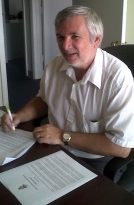
Legal aid under resourced
 (CNS): Among the many issues surrounding the current legal aid system, the auditor general has said that the consistent under budgeting is hindering the management of the programme. Already this year the judicial administration has had to request additional funding three times. Dan Duguay said that while the department’s annual requests for funding had been consistently similar for the last five years, legislators continued to cut the amount they appropriated, forcing supplementary requests in every budget year. The AG also found that the financial records of the system were extremely limited and, as a result, it was not being managed effectively nor was management able to provide information to legislators to demonstrate that the allocation of legal aid is good value and being done fairly.
(CNS): Among the many issues surrounding the current legal aid system, the auditor general has said that the consistent under budgeting is hindering the management of the programme. Already this year the judicial administration has had to request additional funding three times. Dan Duguay said that while the department’s annual requests for funding had been consistently similar for the last five years, legislators continued to cut the amount they appropriated, forcing supplementary requests in every budget year. The AG also found that the financial records of the system were extremely limited and, as a result, it was not being managed effectively nor was management able to provide information to legislators to demonstrate that the allocation of legal aid is good value and being done fairly.
Duguay undertook the independent audit as a result of discussions with the chief justice and against a backdrop of proposed changes to the entire system. Duguay stated that although he found the system was working in accordance with the law, in that all those who were entitled to receive legal aid did so, there were few financial records and therefore little information to make an assessment about how the money was being spent and ultimately the quality of the system.
"The members of the Legislative Assembly cannot do their job of reviewing government programmes such as legal aid when the information they are provided is incomplete or misleading," he said. However, Duguay added that this was not helped by the fact that the budgets were underfunded on a persistent basis.
"The legal aid system is not being managed effectively because of the serious budgeting issues and poor financial management practices," he said.
Duguay stated that with such limited financial information, managers were not able to keep track of what was being spent or if they had exceeded the amount authorized by the Legislative Assembly.
The country’s senior auditor noted that, given the requirements of the legal aid law, the judicial department was obligated to provide legal defence and, as a result, the legal aid management team was faced with the dilemma of breaking the budget appropriations law or the legal aid law.
Duguay noted a number of areas where the system could be improved, most of which the judicial administration agreed with, but it pointed out that to improve the management and efficiency of the system the budget would have to be increased.
Currently the cost of administering the system is very low, the AG found, and pointed out that the money used went on legal representation and not administering the system, which was costing less than $140,000 per annum to cover the cost of one person, office and consumables. However, that in itself was a problem in that without any resources being spent on financial management, the department was essentially handing out legal aid certificates as legally obligated without following up on what was actually being spent.
Duguay also found that no checks are done to find out if those who are awarded legal aid could afford to contribute to the costs of their defence. While applicants are required to supply information, no follow up checks are made to see if the information is accurate.
Also, costs for legal aid cases are not broken down either in terms of individual cases or how much is spent on civil matters in comparison to criminal cases.
Duguay also criticized the cash based accounting system which was being used, as this meant there was no way to determine the true amount owed to attorneys in a given budgetyear. For 2009/10 just over $1 million had been allocated and spent but there were at least a further $100,000 of outstanding invoices that have not yet been paid. The AG’s office said it could be considerably more but there was no system in place to say what invoices were due to come.
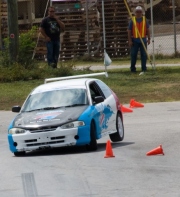
Drivers show skills and endurance on racetrack
 (CNS): Nineteen racers proved their endurance on the race course at the most recent Valvoline & Parker’s Time Attack event, held on Sunday, 21 March, which focused on ‘dexterity’. The races were held at the Progressive Loop behind CUC. Cayman Motorsports Association (CMA) continued its Valvoline &Parkers Time Attack series, which consisted of nine runs for each driver, enabling them to drop the two worst times. The races began earlier than usual, at 9:30am, to facilitate the large number of runs, and were enjoyed by many spectators who got a chance to see all aspects of the races in broad daylight. (Photo: Unlimited Class driver Andy Bodden)
(CNS): Nineteen racers proved their endurance on the race course at the most recent Valvoline & Parker’s Time Attack event, held on Sunday, 21 March, which focused on ‘dexterity’. The races were held at the Progressive Loop behind CUC. Cayman Motorsports Association (CMA) continued its Valvoline &Parkers Time Attack series, which consisted of nine runs for each driver, enabling them to drop the two worst times. The races began earlier than usual, at 9:30am, to facilitate the large number of runs, and were enjoyed by many spectators who got a chance to see all aspects of the races in broad daylight. (Photo: Unlimited Class driver Andy Bodden)
The field was split for a second time in two groups with ten racers running five rounds first and the second set of nine racers running the five rounds last, followed by a lunch break, then the final four races completed by both groups.
The unlimited class was stacked with rivalry: Bobby Hulse, CMA President, in his “Ching Ching” Altezza, boasted a brake setup this time around while Keith Tibbetts III in the Valvoline STi offered a new edge on the opposition with a new suspension. Rounding out the field was the venerable Andy Bodden and Wayne Kirkonnell in the Automotive Art Mirage.
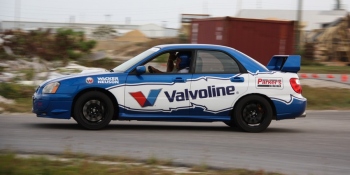 The new class of Two Wheel Drive (2WD) was stacked with some serious competition. Jerad Ebanks in his shared Turbo Starlet placed third, Ajoni Ambersley placed second in his Nissan Primera, and Josen Ebanks placed first in the Turbo Starlet with a combined time of 611.068. Josen and Jerad recently made some changes with the gearbox of the Starlet. Jerad stated, “Finally the car is showing its potential, I’m really pleased with how it feels.” (Photo: Keith Tibbetts III made the fastest time of the day in his Valvoline Subaru STi)
The new class of Two Wheel Drive (2WD) was stacked with some serious competition. Jerad Ebanks in his shared Turbo Starlet placed third, Ajoni Ambersley placed second in his Nissan Primera, and Josen Ebanks placed first in the Turbo Starlet with a combined time of 611.068. Josen and Jerad recently made some changes with the gearbox of the Starlet. Jerad stated, “Finally the car is showing its potential, I’m really pleased with how it feels.” (Photo: Keith Tibbetts III made the fastest time of the day in his Valvoline Subaru STi)
The All Wheel Drive (AWD) class also had very stiff competition with seven racers. Roje Williams was originally meant for 2WD with the VW Golf, but was crippled after a water hose burst. Roje placed third in the Ace Paint Subaru STi RA, Andrew Jackson, normally the Head Steward, hung up his hat for the race and shared the Subaru and placed a close second place, Michael Weatherford placed first also in the same Subaru he finished with an impressive time of 601.008. Roje placed first in the Street Battle Run with a fastest time of 82.435 for his class.
With only four drivers in the Unlimited Class, each one pushed his own car to the limits. Bobby Hulse placed third in his Toyota Altezza, Andy Bodden second in the Automotive Art Mirage, and Keith “Speedy” Tibbetts III slipped into fist with a time of 571.761 in his Valvoline Subaru Impreza STi. Keith also landed first in the Unlimited Battle Run with a fastest time of 79.855 in a single run.
Throughout the day times dropped significantly – even newlywed Ian Charlery saw significant time drops. All racers and spectators alike were overly satisfied with the ‘dexterity’ and were left waiting in anticipation for the next event to be held on Saturday, 24 April 2010.
The CMA Board (President Bobby Hulse, Vice President Wayne Kirkconnell, Secretary Keith Tibbetts III and Treasurer Ian Tibbetts) thank Parker’s and Valvoline for sponsoring this year’s Time Attack series. Also, many thanks to the competitors, spectators and volunteers for making this event a success. For more information on the Cayman Motorsports Association andhow to become a member and get involved, please email the Board at racing.cma@gmail.com.